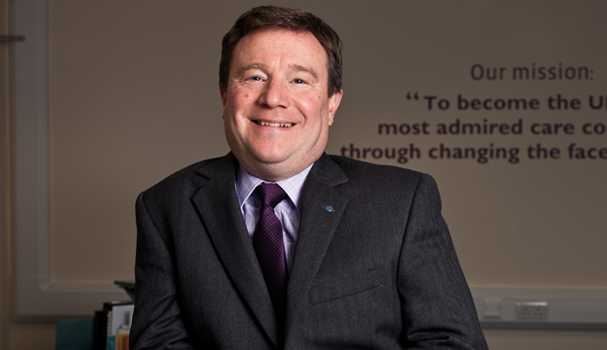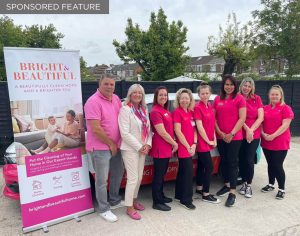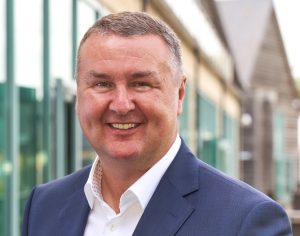Ten years ago, Trevor and Sam Brocklebank had paid off their mortgage, had a healthy balance in”their savings account and lived a comfortable life. After a substantial stint in the red, they’re steadily rebuilding their financial fortunes”– having started Home Instead Senior Care, the Brocklebanks are feeling rich in an altogether different sense.
Care was a complete departure from the career to which Trevor Brocklebank had become accustomed. After a brief stint in the army and studying for a degree in computing, accounting and physics atLeicester Polytechnic, now De Montfort University, the Warrington-born petrolhead set his sights on a job in the automotive industry.
Having written to all of the car companies, at 22, Nissan offered him a job at its burgeoning business in Tyne and Wear. “When I started, there were less than 80 of us in a couple of portacabins,” says Brocklebank. “By the time I left, eight years later, we were making 100,000 cars a year.”
During the course of his seven years with Nissan, he travelled all over Europe, backwards and forwards to Japan, and was promoted through the ranks to eventually become senior controller, which meant he was responsible for purchasing and logistics of the prototype development programme. An ambitious kinda guy – Brocklebank was the youngest senior controller in Nissan in the world – he began to get bored. “At this point it was just tweaking and fine tuning, and whilst that’s a very important part of the ongoing development of the company, I’m not a tweaking and fine-tuning sort of person,” explains Brocklebank.
Departing for Mercury Communications, which is now part of Cable and Wireless, he thrived in his role as deputy director of purchasing and supply. There was certainly plenty for him to get his teeth into as the company had some archaic practices, he says. “Mercury had a very modern brand image, but was actually a very traditional ex-government- run business full of hierarchy, traditional processes and very inefficient ways of operating,” explains Brocklebank. “We saved about £10m in the first year, although I think that’s more reflective of how badly things were being done rather than what a great job we were doing,” he adds, modestly. “Everywhere you looked there were just massive opportunities to save money.”
Before long, his feet began to itch once more. “One day I realised that all these sales guys coming in to see us were probably earning twice as much money as me and only working half as hard. I thought: ‘someone’s got this wrong – and it’s not them’,” says Brocklebank. He moved into a business development role with Mercury, which saw him putting together propositions for the manufacturing industry, which, given his background with Nissan, was a good fit.
He was so strong in the role that he was headhunted by arch-rival BT, where he stayed for just 18 months, “which was about 17 and a half months too long,” he says, deadpan. “This is going back 20 years, so things may have changed, but back then it was such a badly organised business: things we promised customers didn’t happen, installations didn’t run to schedule.”
Having grown tired of corporate life, Brocklebank decided it was definitely time to go it alone. “I’d spent ten years working to get this big salary and corporate expenses account. Then I got there and suddenly thought, ‘this isn’t for me’. The thought of spending another 20 years doing what I was doing was unbearable,” he says.
Meanwhile, his wife Sam had been carving out a successful career of her own and was working for Deloitte, the professional services firm, as an SAP consultant. “We thought with my commercial background and her technical skills there must be something we could do,” explains Brocklebank.
In the meantime, Brocklebank was given some equity in a CRM consultancy that was starting up, as the founders couldn’t afford to pay him for consultancy work. It was a pivotal opportunity for the wannabe entrepreneur emerging from corporate land. “It was almost like an MBA in running a small business,” he says. “A year later we sold that business to a dot com company and that really was an invaluable experience for me.”
Then from his bottom drawer, Martin produced another master franchise opportunity: Home Instead Senior Care. The prospect of running a business that offered superior care to older people appealed to Brocklebank. “In one of those serendipitous moments, my grandfather had been ill and the care he’d got had been rather shocking. The more I looked at what happened with my granddad, the more I thought ‘there’s got to be a better way of delivering care.'”
The Home Instead franchise, that had begun in the United States and now operates in 17 countries around the world, offers clients the opportunity to have high-quality care in their own homes. This would often save them the trauma of having to relocate to a care home.
Taking on the franchise would mean sacrificing their lucrative careers in IT consultancy – but it was a cross the Brocklebanks were willing to bear. “For me, making a difference is far more important than how much money you can make. We were in the very fortunate position of having the mortgage paid off and money in the bank so we could afford to ask, ‘what do I want to do?’ rather than ‘what do I have to do?’ Money is important when you haven’t got any, but I think where a lot of people go wrong is they don’t realise they’ve got enough and keep pursuing it.”
![]()

































